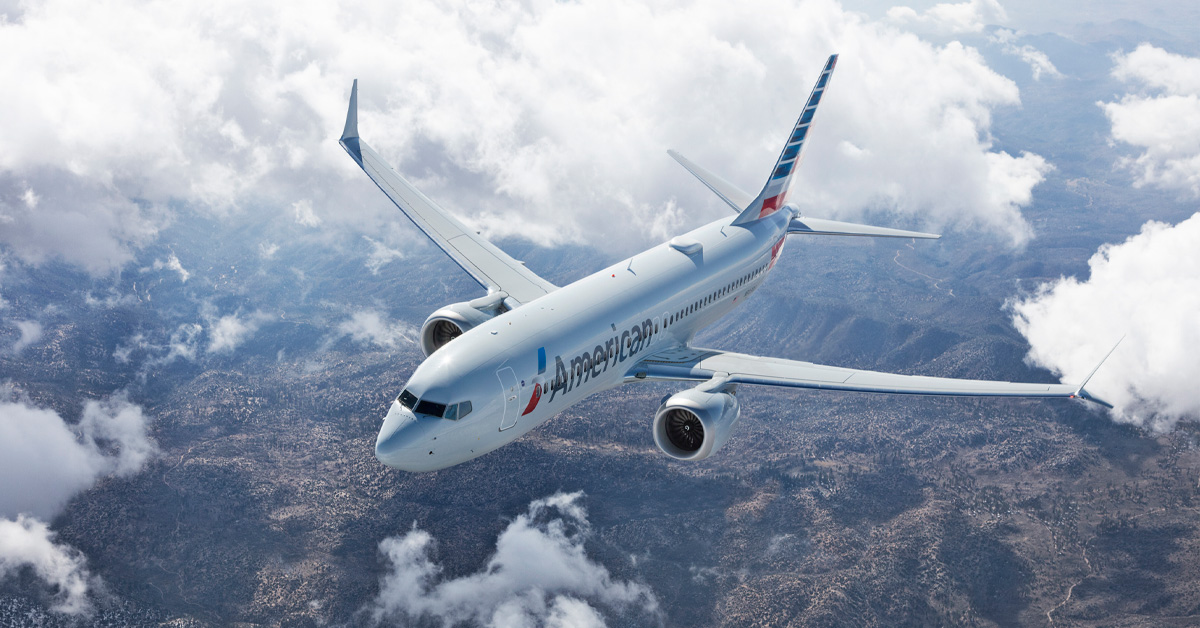
Last month I wrote about American Airlines confronting a man who was was engaging in throw-away ticketing and warning him to cease and desist or face consequences. He did not, and now has received a hefty bill from American Airlines for skipping flights.
American Airlines Sends Man Bill For Skipping Flights
“Hidden City” or “Throw-Away” ticketing is not illegal, but it is against an airline’s contract of carriage that you pledge to abide by when you book a ticket. The concept is simple. Airlines often charge more for direct flights so when booking, say, Los Angeles to New York, it may end up costing more for that flight alone than booking Los Angeles to New York to Orlando, even though the LA to NY flight is the same.
A man was “caught”in the act. He was traveling from Charleston to Washington National via Philadelphia to save a few bucks over just flying Charleston to Philadelphia nonstop. During check-in, he was advised his account had been flagged and he needed to take both flights or he would face further action from American Airlines.
He still (foolishly, in my mind) skipped the flight. Here’s what American Airlines sent the him several days later, per View from The Wing:
As an analyst with American Airlines, one of my responsibilities is investigating violations of the General AAdvantage Program Conditions. An audit of your AAdvantage account, determined that you have engaged in the practice known as ‘Hidden City ticketing’; the purchase of a fare to a point beyond your actual destination. Hidden city ticketing is explicitly defined in AA’s Conditions of Carriage as a violation of ticket validity. The Terms and Conditions of the AAdvantage program further state that compliance with the Conditions of Carriage is compulsory for participation in the AAdvantage program. As such, AAdvantage account [Redacted], is restricted, pending the outcome of our investigation. You may review the terms and conditions of the AAdvantage program (several parts of the terms and conditions are noted below) by clicking the link below or by copying and pasting it into your browser.
The audit of your account [Redacted] was completed on [Date]. The following reservations were not issued in compliance with the AAdvantage Terms & Conditions, Conditions of Carriage or AA.com Site Usage policy:
[Spreadsheet of Hidden City Flights Booked And Prices Paid]
Not unlike other commodities, airline seats are market priced. A seat on a non-stop flight is a premium product and commands a higher price. Seats in connecting markets must be priced competitively and hence can be substantially cheaper. The ill-effects of point beyond ticketing are two-fold; the customer receives the flight for a price for which they aren’t entitled and a seat is spoiled on the separate connecting flight. An airline ticket constitutes a contract and the terms of that contract are stated explicitly in the Conditions of Carriage. Please see excerpts below.
[Name], these actions have resulted in clear and considerable losses to American Airlines. In addition to our loss for the travel provided, tickets booked through prohibited practices are considered fraudulent, and therefore not eligible to accrue mileage. In this case, our loss is further compounded through the Elite mileage accruals, benefits, and services used that were not otherwise available. Generally, violations of this nature subject the AAdvantage account to termination. However, we are willing to provide you with an opportunity to restore an equitable relationship through restitution for the loss on your identified travel.
You may respond to this message by [Date and Time] stating you would like to bring your account back to good standing. At that time, the segments will be re-priced based on your intended travel and we will send you the information so that you may make the appropriate reimbursement for the travel provided. Failure to return the account to good standing or to reply, will result in the termination of your AAdvantage membership and all its benefits, including all remaining AAdvantage miles in your account and any award tickets issued from it.
He received a bill for $1,000 to bring his account back into good standing. He’s a Platinum member with AAdvantage. Not sure how many points he has, but that’s a reasonable (albeit still hefty) bill. I’d pay it and stop skiplagging.
CONCLUSION
American Airlines is known as the most aggressive airline when it comes to cracking down on real or perceived ticketing irregularities by customers. My rule of thumb remains: don’t jeopardize your prized frequent flyer accounts by engaging in throw-away ticketing. In this case, I would pay the $1,000 and cease further throw-away ticketing.
(H/T: View from the Wing)




Curious. Are we supposed to bend merely because an airline slips in a nonsensical clause in their T & C’s? The only reason why there is no uproar over the over-reaching T & C’s regarding hidden-city ticketing is that it is only travel nerds like us that even know what Terms of Carriage even means! Airlines have every right to price their routes as they see fit, but once a ticket is issued, the notion that they get to continue to have an influence over the obligation to complete an itinerary is ridiculous. Tax evasion is criminal, while tax avoidance is simply prudent financial management. Hidden-city ticketing shenanigans can be controlled through numerous yield-management tools, but fining a Platinum flyer? Not the way to go. I will be crossing American off any future travel plans.
I totally agree with you. But while AA cannot come after you in any criminal/civil way, they can shut down your account. That’s your risk-benefit analysis and why I never do this on United, my airline of choice that I hold top-tier plus lifetime status in.
But you are okay stealing from other carriers? Classy… Not.
Sorry, I don’t consider it stealing at all. Please justify why you make such a foolish assertion.
I’m sorry but it is 100% stealing. Or theft. Or conversion. Whatever you want to call it, No question in my mind. You are tricking the airline into selling a $200 ticket for $100. This isn’t rocket science.
A + B is $100. It should be my business how I choose to use it, as long as I am willing to accept the consequences (up to and including a breach of contract claim). Why should I pay more for a part than for the whole? It logically makes no sense. It’s not stealing by any stretch of the word. It does run afoul of the contract of carriage, but I think it is ethically questionable in the first place to impose such a restriction.
It is also hard to see their argument that a seat was wasted on the connecting flight. Either there were many empty seats on the flight (in which case his empty seat doesn’t matter), or it was oversold in which case they could fill it at boarding when he didn’t show up.
How much could he have possibly saved by engaging in such practice? Possibly much less than $1000 right?
Perhaps cumulatively over time it amount to $1,000. I know when I’ve done it (with other airlines) it has often saved me $150+ in one shot.
How did they come up with $1,000 as the amount? Seems arbitrary. While I would defend the rights of AA to enforce is Contract of Carriage, I do wonder if the time and effort AA puts in to auditing and enforcing this could really ever pay off? How many people actually do this, how often, and what is the estimated “loss” to AA?
I appreciate that SWA has a much clearer cost structure for which hidden city ticketing could never result in a lower total fare, and other airlines should take note.
I would love to see one of these cases litigated, it often seems as though the airline has a pick and choose mentality over which CoC clauses to enact. The ones beneficial to them seem to be the ones they often choose.
I doubt you will ever see this litigated because the odds of them losing are too great. Even if someone got sued because of it (and not as part of a larger package of fraud, like using stolen miles), I would fully expect the airline to drop the case before it ever went to trial, even if the defendant refused to sue. Too much risk of the clause being found as unenforceable.
Matt,
I feel like I read this already (including letter verbatim) somewhere else. How did you obtain the letter?
If this is indeed simply a recap of Gary’s reporting and quote of source material he obtained, a bit more than a hat-tip in a footnote is warranted, no?
That said, I find your content to generally be more original and read-worthy than the original source referenced here.
I include two links to Gary’s work. He is free to let me know if I need to do more, but I do believe this is sufficient and the letter itself is not his work product. Many thanks to Gary for covering this issue, which is one of my favorite topics.
Oh, I only saw the H/T at first. I see you also credit him with the letter in the body as well.
Also, “throwaway ticketing”, is more closely associated with flying only one sector of a roundtrip ticket (i.e., the practice of a roundtrips with a Saturday night stay because it is less than a one-way, but not using the return). “Hidden City” specifically relates to the practice of purchasing a ticket to a beyond point, with no intention of flying to the purchased destination.
English is funny. They could have meant AA sent the flyer an antique $1000 note (bill), currently worth $1400.
@Matthew : then i must be the worst of the bunch. Literally the one single flight where i crossed over to 1 Million Miler…..
was HCT …… to another nation =p
As I recall the guy saved $25 on the flight mentioned – sounds like he was doing the hidden city thing more for sport than for savings. He probably should have refrained from using his AA number on flights such as this.
Meanwhile AA can screw over pax at will and vaguely blame “security” or “weather.”
Isn’t it ironic that they have no problem stranding you, when you’ve purchased a service. But they want to bill someone for deciding not to use a service they’ve purchased?
Easy: Pay it and move on. You win some and you loose some. It was nice enough of AA to issue him a warning, and he continued doing this. Take the $1k as a “citation” and if your skipping legs has become compulsive try your luck with other airlines.
Apparently some of you are too thick headed to understand that this man’s actions were fraudulent. He knowingly bought a ticket under false pretenses. You all would have a fit if someone were stealing from your place of employment. As stated, DIRECT FLIGHTS are considered premium flights and cost more. He knowingly booked a ticket from point A to point C with a connection in point B for a cheaper price. He never intended to go to point C because point B was his actual destination. He was a REPEAT OFFENDER.
Personally, I have never found the price difference in HCT worth the hassle or the risk. Was he using his frequent flyer number? Or did they just manage to link him up in the system somehow?
Anyway, breaching a contract is not the same as fraud. I have not gone back to look at it again, but a contract should say what the consequences of the breach may be – the airline not having to fly you, to charge you the difference, or whatever. And this contract is a contract of adhesion, so the standard for applying it may be a little different. I would think it could be hard for an airline to get money for a breach in court if there were no actual damages to the airline. Taking his miles away or banning him may be within the rights of the airline, but I don’t know about cash recovery.
And that damage issue is really the issue with HTC. If I sell a slice of pizza and a beer for $5 and just a beer for $6, I am going to get a certain amount of people buying a beer and as slice but not eating some or all of their pizza. Are they committing fraud? Hard to get upset about that. Even if I told them they had to eat both before selling it to them. Because I may have had the right to say that, but that doesn’t make it reasonable. And if it is not reasonable, it may be hard to enforce.
A seat on a non-stop flight is a premium product and commands a higher price. Seats in connecting markets must be priced competitively and hence can be substantially cheaper.
I wonder how Federal regulators might consider the AA words above. If there are two carriers between the non-stop city pair, presumably the “premium product” needs to also be priced competitively. Competitively may limit higher.
Unless there is collusion.